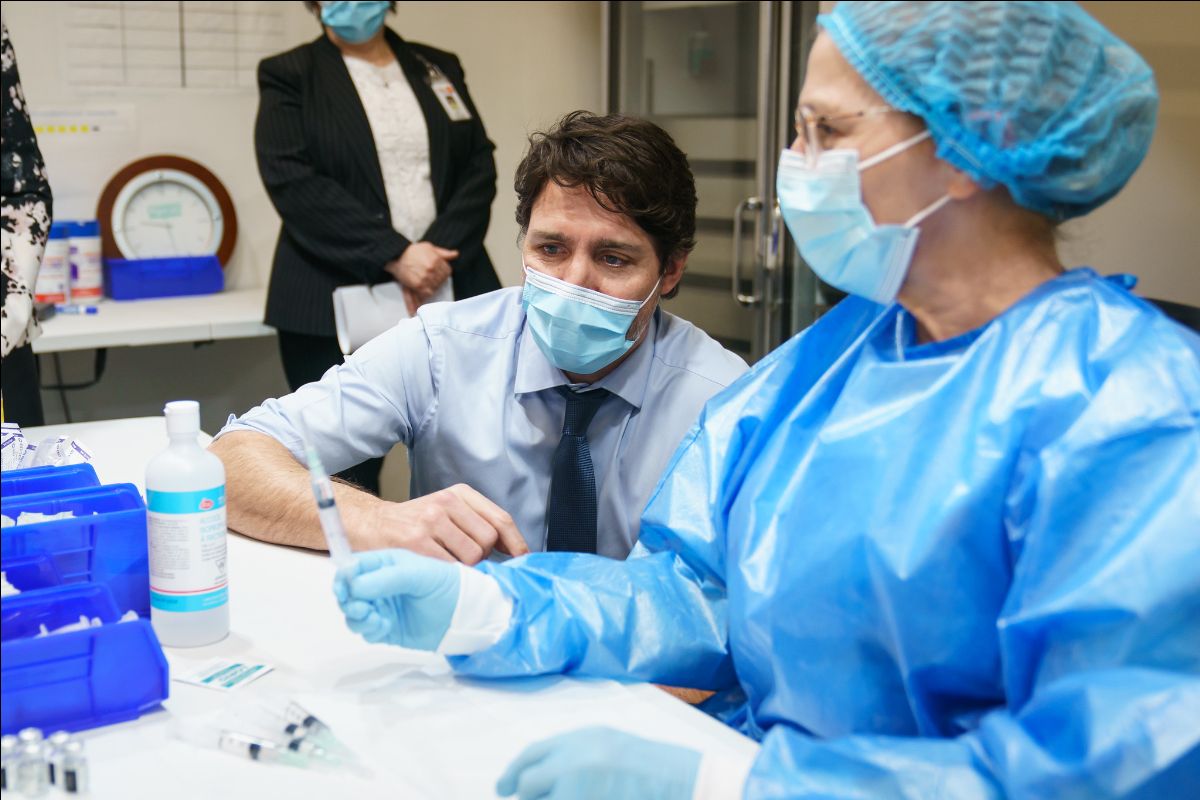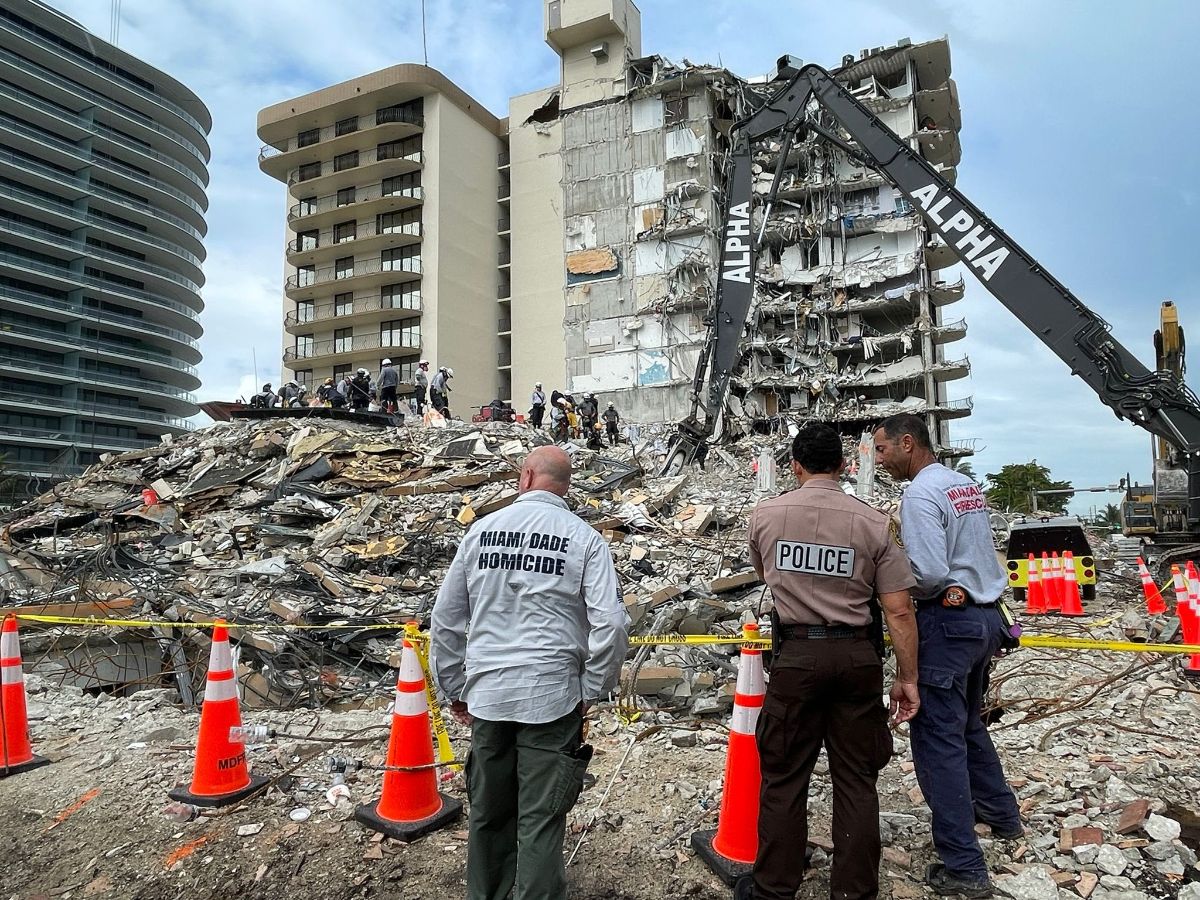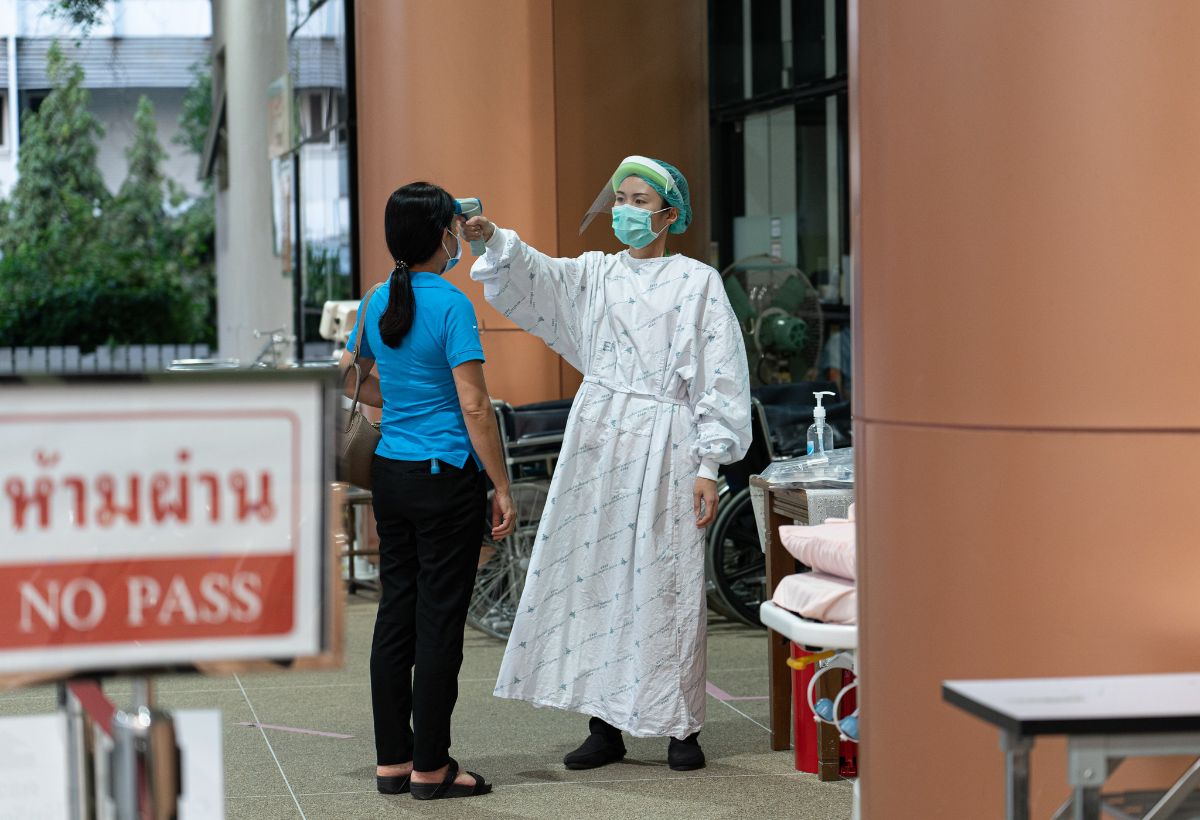Top photo: A healthcare worker takes another person’s temperature at the Thailand Bamrasnaradura Infectious Disease Institute in April 2020. (Photo: UN Women / Pathumporn Thongking)
Welcome to Factal Forecast, a look at the week’s biggest stories and what they mean from the editors at Factal. We publish our forward-looking note each Thursday to help you get a jump-start on the week ahead. If this email was forwarded to you, and you like what you see, you can subscribe for free.
A look ahead:
July 1/ Phuket, Thailand, reopens to tourists: Thailand reopened Phuket on Thursday to fully vaccinated tourists from countries deemed low-to-medium risk for coronavirus. Tourists will no longer have to isolate themselves for 14 days upon arrival.
- What’s happened so far: While Thailand has been battling a third coronavirus wave since April, with Bangkok recording an all-time high in daily cases last week, the government is determined to revitalize its battered, tourism-reliant economy. Phuket’s reopening, a tourism-oriented pilot project, included a mass vaccination effort that inoculated more than 75 percent of the island’s population compared to approximately 4 percent nationwide. Meanwhile, new restrictions have taken effect in Bangkok and five surrounding provinces to contain the country’s worst coronavirus outbreak so far.
- The impact: Daily coronavirus case tallies in Phuket are currently in the single digits, but the potential spread of variants is still a concern. Thai health officials have warned Phuket’s reopening scheme could be suspended or canceled altogether if the situation spirals out of control.
July 3/ Carnival Cruise Line restarts operations: The Carnival Vista cruise ship is set to sail from Port of Galveston, Texas, on Saturday — the first time a Carnival Cruise Line ship has sailed from the United States in more than a year. All passengers are required to be vaccinated against coronavirus for at least two weeks before boarding the ship.
- What’s happened so far: At least two cruise ships that recently returned to sea have already seen positive coronavirus cases and a third ship’s journey was delayed after crewmembers tested positive. The CDC has issued comprehensive guidelines for ships, including screenings and increased personal protective equipment, but rules have met resistance in some states. In Texas, where a new law prohibits businesses from requiring proof of vaccination, Gov. Greg Abbott appeared to suggest the law applies to Carnival. Meanwhile in Florida, a federal judge ruled the CDC’s orders “exceed the authority delegated” to the agency and granted a preliminary injunction blocking their enforcement in the state.
- The impact: Carnival, which operates several cruise lines with a combined fleet of more than 100 vessels, recently reported more than $2 billion in losses in its latest quarter and more than $14 billion since the pandemic started. The shutdown has impacted thousands of workers and many ports that rely on the tourism sector to keep things afloat. Carnival appears confident they can fill ships, however, with CEO Arnold Donald saying demand outstrips supply.
July 3/ Burkina Faso opposition protests: Burkina Faso opposition groups are expected to march throughout the country Saturday as part of silent demonstrations against the government’s failure to tackle a growing jihadist insurgency.
- What’s happened so far: Groups linked with Islamic State and al-Qaeda have been gaining ground in Burkina Faso and the wider Sahel region since 2012. As many as 160 people were killed in an attack on the village of Solhan on June 4, an event opposition leader Eddie Komboigo said “represents the climax of the slaughter” by Islamist groups. Burkinabé President Roch Kaboré urged the opposition to call off the demonstrations, saying they “will not make it possible to overcome terrorism in our country.”
- The impact: Despite the demonstration, political instability in the region and France’s scaling back of its Operation Barkhane force will likely make it very challenging for Burkina Faso to take substantive action on the jihadist insurgency in the coming months. Along with the military challenges that come with targeting disparate groups in a vast and largely lawless region, the country is also facing a refugee crisis, with more than 1.2 million people displaced by the violence.
July 4/ Tokyo prefecture elections: Tokyo residents will cast votes Sunday in the election for the 127-member metropolitan assembly in the largest city in the world.
- What’s happened so far: While flying under the radar of the forthcoming Olympic Games, the election will serve as a bellwether for where voters stand ahead of Japan’s general elections set to take place on or before Oct. 22 when Lower House lawmakers’ terms end. Campaigning for the election began June 25, and Gov. Yuriko Koike’s incumbent party will seek to hold on to its plurality after handing Japan’s ruling LDP party a historic defeat in Tokyo’s 2017 elections.
- The impact: The race will once again pit Gov. Koike’s Tomin First no Kai regional party against the country’s ruling coalition featuring Prime Minister Yoshihide Suga’s LDP and Komeito. With Tokyo’s election just months before national elections — the first since Suga took over for long-serving Shinzo Abe — several national LDP figures, including Suga himself, have been campaigning. The leader of Japan’s largest national opposition party, the CDP, also directly campaigned. With voters feeling discontent regarding the handling of the coronavirus pandemic and the Olympics, polling appears to show the LDP and Komeito poised to reverse losses of 2017 and secure a plurality.

July 5/ Jeff Bezos steps down as Amazon CEO: Jeff Bezos, the world’s richest man, will step down as chief executive officer of Amazon on Monday. He will continue to serve as executive chairman of the multinational tech company’s board, with Andy Jassy replacing him as CEO.
- What’s happened so far: After announcing the news back in February, Bezos said during the company’s annual shareholder meeting last month that he would be stepping down Monday, on the same day Amazon was incorporated in 1994. In the years since, Amazon has become one of the most successful companies in the world, reaching a net value of $1 trillion last year. Bezos, who also recently endured a public divorce from his wife of more than 20 years, is himself worth nearly $200 billion.
- The impact: In stepping down as CEO, Bezos is expected to focus his time on other initiatives like his Earth Fund, the Washington Post and the Amazon Day 1 Fund. Jassy, who currently leads Amazon’s cloud computing business, will become the new CEO of the company. Analysts say that move signals Amazon Web Services, the division that brings the largest amount of sales, is at the core of the business. Others also suggested that Big Tech could be nearing the end of the founder-CEO era, with Larry Page and Sergey Brin also stepping down from their respective roles as CEO and president of Google parent Alphabet.
July 5/ Canada lifts some border restrictions: Canada will begin lifting some of its coronavirus border restrictions for fully vaccinated citizens Saturday.
- What’s happened so far: The Canadian government last week outlined the first phase of its border-reopening process amid rising vaccination rates. Canadian citizens and residents who have been fully vaccinated will be eligible to cross the border beginning Saturday. Those who wish to enter the country must have been fully immunized at least 14 days before the date of entry with any of the government’s approved jabs and must present proof of vaccination. Travelers who meet these requirements will not be required to quarantine unless they test positive for coronavirus.
- The impact: This first phase of reopening doesn’t allow non-essential travel for countries like the United States. The Biden and Trudeau administrations have agreed that border closures between the neighboring countries will remain in place until at least July 21 amid Canada’s fears that its national second-dose vaccination rates are not high enough to prevent another spike of infections. Prime Minister Justin Trudeau, however, expressed optimism over the late-July deadline thanks to the progress of the immunization programs and the latest infection statistics.

July 6/ High court hearing on same-sex marriage in India: The high court in Delhi, India, on Monday is set to hear petitions seeking legal recognitions for same-sex couples.
- What’s happened so far: In 2018, India’s Supreme Court struck down parts of a colonial era-section of the Indian Penal Code that deemed consensual homosexual acts as illegal. The legal system, however, still does not recognize same-sex marriages, leading several couples to file petitions with the Delhi High Court. In response to the case, the central government in February 2021 submitted an affidavit to the court stating that, in India, marriage was a “bond between a biological man and a biological woman,” therefore same-sex couples could not claim a “fundamental” right to be recognized under the country’s laws. In late May, the court adjourned hearings until July 6, with the solicitor general saying the court will only hear “extremely urgent” matters during the coronavirus pandemic.
- The impact: Legal recognition of same-sex marriage would grant couples legal protection and rights currently afforded to heterosexual marriages, such as property rights or end-of-life decisions. India’s central government, however, claimed changes to the existing marriage laws could cause “complete havoc” within the country’s personal laws, with potential implications for laws on marriages of people with different faiths. While it remains to be seen the court’s decision remains unclear, the cases have brought the issue into the public eye in a country where discussing topics on LGBTQ rights can still be considered taboo.
July 9/ Isaac Herzog inaugurated as president of Israel: Isaac Herzong, the former Israeli Labor party head, will succeed Likud party member, Reuvin Rivlin, as the 11th president of Israel on Friday. He has pledged to unify and “build bridges” across Israeli society during his seven-year tenure as the country’s ceremonial figurehead.
- What’s happened so far: Herzog received a 60-vote majority in the Knesset against his conservative opponent, Miriam Peretz, who would have become the first female president of Israel had she won. The former lawyer and current chairman of the Jewish Agency has been described as a member of the political elite — his father served as president in the 1980s and 90s, and his grandfather was a prominent Rabbi.
- The impact: A landslide victory for the left-leaning candidate marks a rare moment of unity in the fractured environment of Israeli politics and has been seen by some as further evidence that Benjamin Netanyahu’s era is coming to an end. Presidential powers in Israel are limited on paper — a president’s main responsibility is to lead the process of forming a new government. But in a country that has witnessed four elections in the past two years, Herzog will likely play an important role in shaping the future direction of Israeli politics.

(Photo: Miami-Dade Police / Twitter)
What else matters:
Florida building collapse: As of Wednesday evening, 18 people are confirmed dead and approximately 150 more remain missing, as rescue efforts continue nearly a week after the partial collapse of a 13-story condo tower in Surfside, Fla. Prosecutors in South Florida said they will pursue a grand jury investigation, which could lead to criminal charges, while the National Institute of Standards and Technology may also launch a probe.
- Watch for: In the days since the collapse, details have emerged regarding “major structural problems” in areas of the condo tower, in stark contrast to what the chief building official for the town of Surfside told residents in 2018. Earlier this year, a condo official warned that the damage chronicled in that report had “gotten significantly worse,” while pictures taken just days before by a pool contractor captured cracked concrete, exposed rebar and puddles of standing water in the condo’s garage. But it’s likely to be several months before investigators determine what exactly triggered the collapse. President Joe Biden is scheduled to visit the site Thursday, after approving an emergency declaration ordering federal assistance in response and recovery efforts.
Tigray conflict: The ongoing conflict in Ethiopia’s Tigray region reached a new phase this week after rebel forces recaptured the region’s capital Mekele and Ethiopia’s government declared a ceasefire. It marks a stunning reversal for Ethiopian Prime Minister Abiy Ahmed, who declared victory in the region seven months ago. Since then, Ahmed has enlisted the help of local ethnic militias and Eritrean soldiers, many who have been accused of committing atrocities, to try and squash the rebel uprising in Tigray. The civil war has increasingly been scrutinized by the international community, especially after news earlier this month of a government airstrike on a marketplace that killed dozens.
- Watch for: Ethiopia’s withdrawal of troops from Mekele this week was surprising, since federal forces had held much of the region since November. Rebel forces show no signs of agreeing to a truce, telling the media they plan to “weaken or destroy” Ethiopia’s and Eritrea’s armies even if it means fighting on foreign soil. If Tigrayan forces expand outside of the region, it would be a major escalation.
Extended outlook: What’s on our radar in the coming weeks
July 1: 100th anniversary of the founding of the Chinese Communist Party; Phuket, Thailand, reopens to tourists
July 3: Carnival Cruise Line will restart operations with vaccinated passengers; Burkina Faso opposition to hold silent protests
July 4: Tokyo prefectural election; primaries for 2021 Chilean presidential election
July 5: Jeff Bezos steps down as CEO of Amazon; Canada lifts some border restrictions; indoor pub and restaurant service could resume in Ireland
July 6: Delhi High Court hearing on same-sex marriage in India
July 9: Isaac Herzog to be inaugurated as president of Israel; plea hearing set in Sarah Everard murder trial
July 11: Elections in Moldova; Bulgarian parliamentary election
July 13: 2021 Major League Baseball All-Star Game in Denver
July 14: Bastille Day military parade in Paris
July 16: Bank of Japan meeting
July 19: International travel could resume in Ireland
July 20: Planned launch of first crewed flight aboard Blue Origin’s New Shepard
July 22: European Central Bank monetary policy meeting in Frankfurt
July 23: Tokyo Summer Games
July 26: Expected end of trial for deposed Myanmar leader Aung San Suu Kyi
July 27: Runoff election for Texas’ 6th congressional district
July 28: Pedro Castillo to be sworn in as president of Peru
July 30: Planned launch of Boeing Starliner Spacecraft 2

